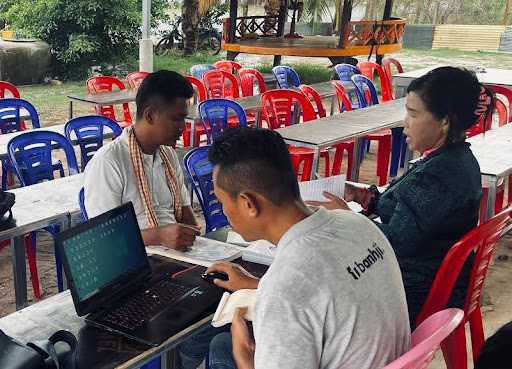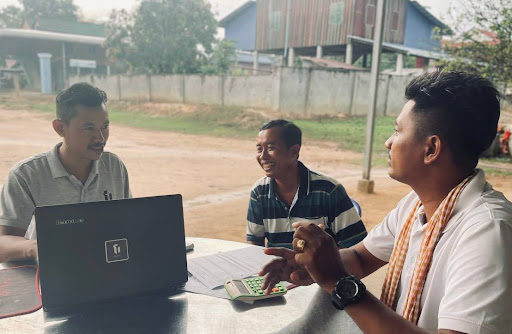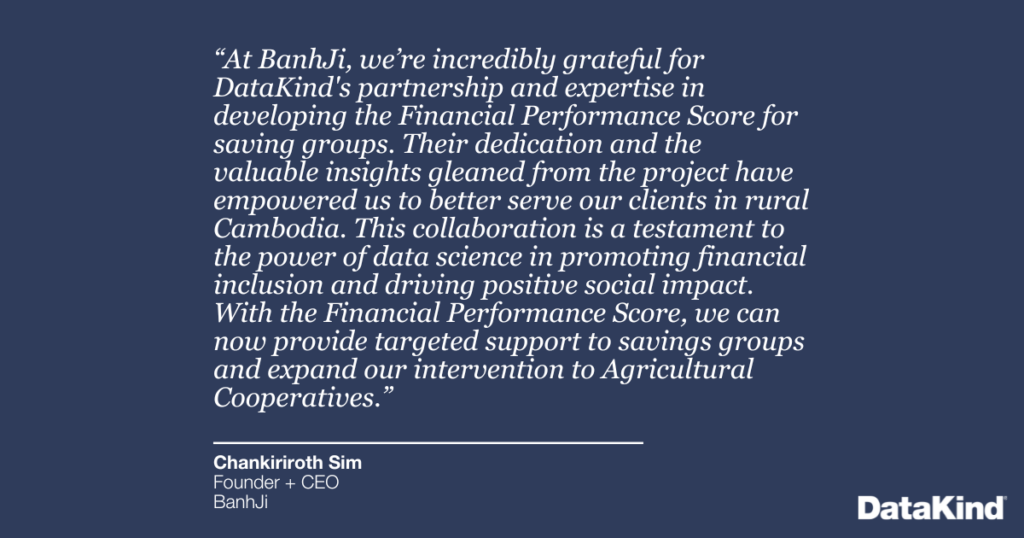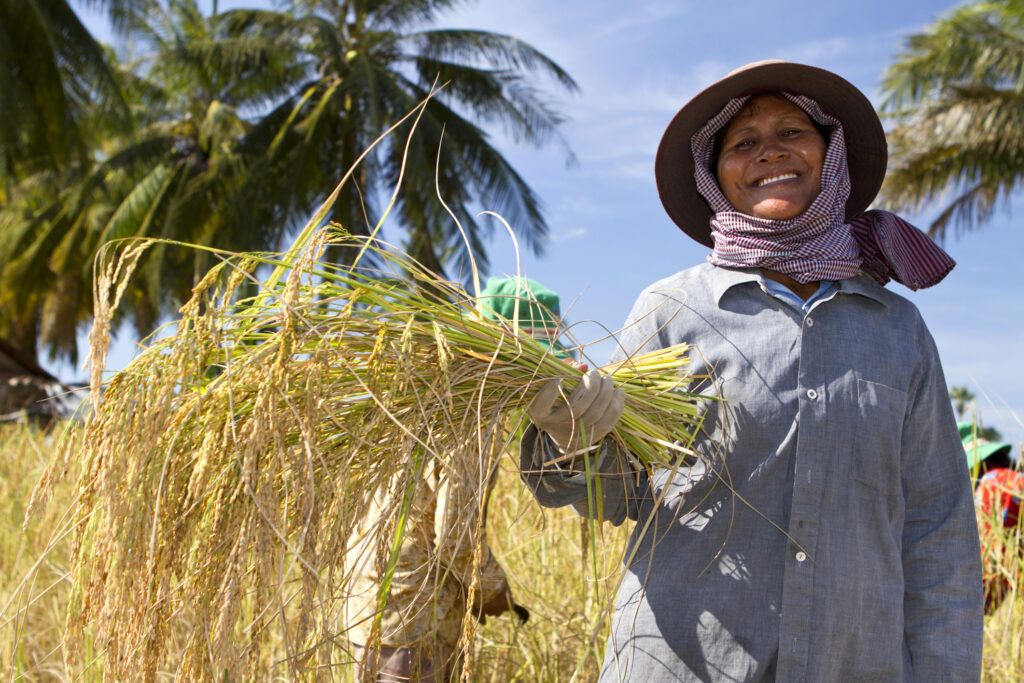In low and middle-income countries, savings groups play a crucial role in fostering financial inclusion and empowerment, especially among rural communities. These self-managed financial systems provide farmers with access to savings, credit, and financial literacy. However, challenges such as over-indebtedness and limited access to formal financial services persist, hindering the economic well-being of farmers.
Recognizing the challenges faced by farmers in Cambodia, BanhJi, a fintech start up, provides structured credit solutions while mitigating the risk of over-indebtedness. DataKind partnered with BanhJi to develop a group-level Financial Performance Score, producing actionable insights to savings groups to improve financial performance. By leveraging data-driven recommendations, savings groups can make informed decisions to improve their financial resilience and access affordable credit solutions, promoting sustainable economic development.
Background
Savings groups, also known as community-based savings and loan associations, empower individuals in low and middle-income countries to save money, access credit, and build financial resilience. Despite their effectiveness, savings groups face challenges, such as limited access to formal financial services and over-indebtedness.
Partner Introduction
BanhJi, founded in 2016, is a fintech start up providing a financial operating platform for micro, small, and medium-sized enterprises to enable them with better and easier access to cash and financing. A component of BanhJi’s platform caters specifically to the rural community, where it serves approximately 40,000 families across 880 savings groups and agriculture cooperatives. Recognizing the challenges faced by farmers in Cambodia, BanhJi seeks to empower clients to access structured credit solutions, while mitigating the risk of over-indebtedness.
DataKind partnered with BanhJi to develop a Financial Performance Score for their savings groups, leveraging data-driven insights to target capacity building activities and benchmark the sector.

The Collaboration
Through scoping conversations with the BanhJi team, DataKind identified two key pain points to financial inclusion for farmers in Cambodia:
- Farmers take out more credit than they’re able to repay, and therefore fall into a cycle of over-indebtedness, where they’re either unable to repay their loans or must seek a new loan to repay the previous loan coming to term.
- Formal financial institutions, such as microfinance institutions (MFI), who would like to distribute structured credit to smallholder farmers, don’t have the data-driven insight to ensure they’re helping their clients without promoting ongoing debt. And, access to microfinance institutions would allow farmers to access cheaper financing rather than having to turn to loan sharks.
DataKind leveraged five years of historical data on savings groups to develop a group-level Financial Performance Score. This score provides insights into each group’s financial standing, enabling BanhJi to deliver targeted technical assistance to enhance financial performance and access formal financial products. DataKind also explored if different loan sizes would reduce the risk of a savings group to default.
Methodology
As mentioned above, data analysis involved five years (2018- 2021) of historical loan repayment data, a total of 46,553 loans, from 832 savings groups across Cambodia. The DataKind team focused on loans that had either six or 12 installments, and examined all variations of loan behaviors to understand how frequently ‘defaults’ occurred and in what combinations. Most defaulted loans had more than six late/missing payments.
Features including early payments, late payments, missing payments, default payments, and repeat borrowers were evaluated to develop the Financial Performance Score. K-means clustering was utilized to identify patterns and inform the scoring model design.

Results
Correlation analysis across features highlighted that savings groups payment behavior doesn’t correlate with the amount being borrowed. Further, the data didn’t support the hypothesis that loans at different sizes have different default rates and that recommendations can be built.
Financial Performance Score
The Financial Performance Score ranges from 0 to 100, with higher scores indicating better repayment behavior and an absolute maximum of 110 if they have early payments. We can interpret the ranges of our financial score as:
- 0 – 50: Savings group needs heavy intervention
- 50 – 75: Savings group needs moderate intervention
- 75 – 90: Savings group has a few defaults and may need early intervention
- 90+: Savings group has very few (if any) defaults and doesn’t need intervention
The majority of savings groups exhibit on-time payment behavior, with over 50% achieving scores of 100 or higher.
Impact
This project empowered the BanhJi team with the data-driven insight to target capacity building initiatives for savings groups to improve financial performance. By leveraging data-driven recommendations, savings groups will be able to access formal financial products with lower interest rates from banks or microfinance institutions to scale their operations, thus promoting sustainable economic development.

“At BanhJi, we’re incredibly grateful for DataKind’s partnership and expertise in developing the Financial Performance Score for saving groups. Their dedication and the valuable insights gleaned from the project have empowered us to better serve our clients in rural Cambodia. This collaboration is a testament to the power of data science in promoting financial inclusion and driving positive social impact. With the Financial Performance Score, we can now provide targeted support to savings groups and expand our intervention to Agricultural Cooperatives.” – Chankiriroth Sim, Founder and CEO, BanhJi
Conclusion
The collaboration between DataKind and BanhJi exemplifies the power of data-driven approaches in enhancing financial inclusion for rural farmers. By developing the Financial Performance Score, savings groups can make informed decisions to improve their financial resilience and access affordable credit solutions. This case study underscores the importance of partnerships in leveraging technology for social impact and driving sustainable development in underserved communities.
Here’s more on DataKind’s work in financial inclusion.
DataKind’s partnership with BanhJi was supported by the Mastercard Center for Inclusive Growth.
Join the DataKind movement.
- Interested in supporting our work? Donate here.
- Interested in sponsoring a project? Partner with us.
- Interested in volunteering with DataKind? Look no further.
- Interested in working at DataKind? We’re hiring!
- Interested in submitting a project? Go for it!



